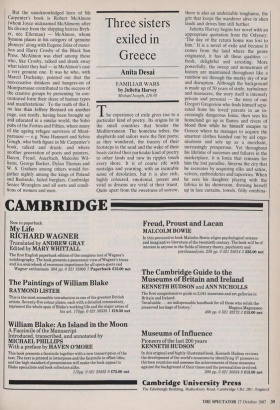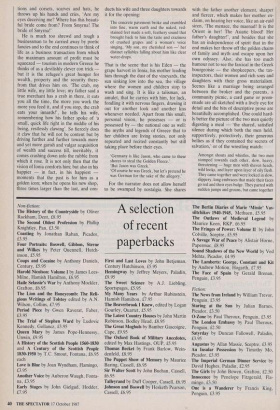Three sisters exiled in Greece
Anita Desai
FAMILIAR WARS by Julietta Harvey
Michael Joseph, £10.95
The experience of exile gives rise to a particular kind of poetry. Its origins lie in the small countries that border the Mediterranean. The homeless tribes, the shepherds and sailors were the first poets; as they wandered, the tracery of their footsteps in the sand and the wake of their boats carried their particular kind of poetry to other lands and now its ripples touch every shore. It is of course rife .with nostalgia and yearning, with an incurable sense of desolation, but it is also rich, highly coloured, emotional, potent and vivid as dreams are vivid at their truest. Quite apart from the sweetness of sorrow, there is also an undeniable toughness, the grit that keeps the wanderer alive in alien lands and drives him still further.
Julietta Harvey begins her novel with an appropriate quotation from the Odyssey: 'The day of the return home was lost to him.' It is a novel of exile and because it comes from the land where the genre originated, it has all these qualities — fresh, delightful and arresting. More powerfully, the sweep and momentum of history are maintained throughout like a rainbow arc through the murky sky of war and disruption. Although the background is made up of 50 years of strife, turbulence and massacres, the story itself is intensely private and personal — the story of one Gregori Gregoriou who finds himself sepa- rated from his loved parents in an in- creasingly dangerous Ionia, then sees his homeland go up in flames and rivers of blood flow while he himself escapes to Greece where he manages to acquire the smartest clothes handed out by aid orga- nisations and sets up as a merchant, increasingly prosperous. Yet throughout his lifetime of successes and failures in the marketplace, it is Ionia that remains for him the lost paradise, Smyrna the city that he recreates by acquiring silks and satins, velvets, embroideries and tapestries. When he sees his daughter playing with the fabrics in his showroom, dressing herself up in lace curtains, towels, frilly combina- tions and corsets, scarves and hats, he throws up his hands and cries, 'Are my eyes deceiving me? Where has this beauti- ful bride come from? From Smyrna! The bride of Smyrna!'
He is much too shrewd and tough a businessman to be carried away by poetic fancies and to the end continues to think of life as a business transaction from which the maximum amount of profit must be squeezed - tourism in modern Greece he thinks of as a devilishly clever con trick - but it is the refugee's great hunger for wealth, property and the security there- from that drives him on. 'The crab, my little wife, my little love; my father said a true merchant has a crab in there, it eats you all the time, the more you work the more you feed it, and if you stop, the crab eats your innards!', he tells his wife, remembering how his father spoke of 'a small, quick life right in the middle of his being, restlessly clawing'. So fiercely does it claw that he will not be content but by driving further and further towards more and yet more garish and vulgar acquisition of wealth and success till, inevitably, it comes crashing down info the rubble from which it rose. It is not only then that the vision of Ionia comforts him; but also in his happier - in fact, in his happiest - moments that the past is for him as a golden icon; when he opens his new shop, three times larger than the last, and con- ducts his wife and three daughters towards it for the opening:
The concrete pavement broke and crumbled into fine, warm earth and the naked, red- stained feet made a soft, feathery sound that brought back to him the taste and craziness of crushed grapes and a woman's voice singing, 'My son, my cherished son -' her distinct syllables falling about him like clear water-drops.
That is the scene that is his Eden - the grape harvest in Ionia, his mother leading him through the dust of the vineyards, the sun sinking low into the sea, the village where the women and children stop to wash and sing. It is like a talisman, an amulet, that he carries with him, for luck, fondling it with nervous fingers, drawing it out for another look and another kiss whenever needed. Apart from this small, personal vision, he possesses - or is possessed by - the national one as well: the myths and legends of Greece that to her children are living stories, not only repeated and recited constantly but still taking place before their eyes.
'Germany is like Jason, who came to these shores to steal the Golden Fleece.'
'But Jason was Greek.'
'Of course he was Greek, but let's pretend he was German for the sake of the allegory.'
For the narrator does not allow herself to be swamped by nostalgia. She shares with the father another element, sharper and fiercer, which makes her mother ex- claim, on hearing her voice, like an air-raid siren, 'The menace, the maenad! It is the Orient in her! The Asiatic blood! Her father's daughter!', and besides that she has an independence of spirit that in the end makes her throw off the golden chains of family and myth and escape upon her own odyssey. Also, she has too much humour not to see the farcical in the Greek bourgeoisie - the shopkeepers, the tax- inspectors, their women and rich sons and daughters with their gross materialism. Scenes like a marriage being arranged between the broker and the parents, a community picnic, a card game or prom- enade are all sketched with a lively eye for detail and the bits of descriptive prose are beautifully accomplished. One could hard- ly better the picture of the two men quietly digesting a meal - 'the shared, satisfied silence during which both the men held, supportively, protectively, their generous bellies as if they contained the secrets of salvation,' or of the wrestling match:
Amongst shouts and whistles, the two men stomped towards each other, slow, heavy, threatening - huge men with shaven heads, wild looks, and layer upon layer of oily flesh. They came together and were locked in slow, slippery, long embraces that made their faces go red and their eyes bulge. They parted with sudden jumps and groans, but came together again, pawing at each other like huge tod- dlers, grasping and clinging passionately to each other, held in tortuous love-holds, until with growls of pain they flung apart and, triumphantly, back together.
Apart from this twinkling, appreciative wit and the heavy, honeyed nostalgia, there is another element that one recog- nises from the older literature of that world — a clear-eyed, unsentimental view of human failings, human passions. The pic- ture of the three sisters — prettily dressed, prettily brought up — clawing at each other vengefully, jealously, is not pretty at all, but very real, very true; the bitter quarrel over property and inheritance re- sembles nothing so much as the battle over the kill brought in by the father in the animal world — all the cubs tumbling over the bloody carcass, dipping their mouths and faces into it greedily. As a child in wartime Greece, Eleni looks at the Ger- man soldiers who occupy a building across the road and fails to see in them the beasts the family and neighbours think them to be; as a young woman, when the whole town is running around seeing visions of the Virgin Mary in every dust pattern and damp stain on the walls and windows, she sees the joke when a man comes along and says, 'These are no miracles! This is pollution. The air is polluted!' and another explains, 'It's DDT. They're spraying the marshes.' She has grown up in hard times, after all, and learnt about the gulf between the real and the imagined. The characters of Gregori the merchant, his difficult and discontented wife Anastasia and their three daughters, are full, satisfying por- traits done in oils — the mother with a love so deep and instinctive that it can scarcely be expressed, the father with an affection that is flirtatious, playful, almost inces- tuous, the sisters with a venom that bor- ders on the grotesque. In comparison the minor characters of the townspeople — merchants, soldiers, terrorists — are drawn on a smaller scale as they might have been according to the rules of ancient drama where the heroes and heroines inhabited one level, spoke in one manner, and the subsidiary characters in quite another.
Julietta Harvey's first novel combines dry wit with passion, and a sense of history with a wonderfully sensuous aware- ness of the immediate. When one reads a line like 'Hiding her head in her mother's lap, seeking its familiar smell — warm, sweet — salty — stale, forbidden', one knows one is in the presence of a con- siderable new talent. One also sees that, apart from such craft, there is a richness of material suggested in lines like:
'Life,' he mused philosophically, as he patted the donkey on the back, `Deee,' he said to the donkey. 'Life', he repeated and started with his donkey up the alley.
Familiar Wars has been shortlisted for the 1987 Angel Literary Awards.




























































 Previous page
Previous page